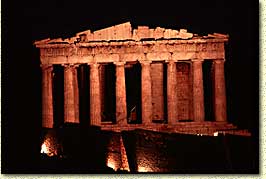The Emergence of the Greek Polis
 There is a great deal of controversy surrounding the question
of why Greek communities became poleis. Some historians and
political analysts found it inevitable. Aristotle, in fact, claimed
that the polis was the natural situation for mankind. He defined
humans as "beings who by nature live in a polis" (Politics 1253a2-3). However, the polis was a unique Greek invention
and far from inevitable. The specific geography and history of
Greece allowed its conception. There is a great deal of controversy surrounding the question
of why Greek communities became poleis. Some historians and
political analysts found it inevitable. Aristotle, in fact, claimed
that the polis was the natural situation for mankind. He defined
humans as "beings who by nature live in a polis" (Politics 1253a2-3). However, the polis was a unique Greek invention
and far from inevitable. The specific geography and history of
Greece allowed its conception.
The polis consisted of the city and its surrounding lands and
communities. The whole area was an individual unit with
self-rule. Unlike the Mycenaean cities of Greek's past, where the
powerless poor answered to the powerful aristocracy and the godlike
king, every citizen was at least equal under the law. Citizenship
was limited to natives, and only male adult citizens could exercise
the vote, but power was distributed more widely than in any
previous political system.
The polis was most efficient if it was small, since large
groups were hard to coordinate as a decision-making body. Greek
political theorists judged that 5 to 10,000 citizens was the ideal
size of a Greek polis. In such a sized community, most citizens
could at least recognize by face most other citizens.
Greek geography helped keep communities small. Covered with
mountains and inlets, it provided many natural barriers that
isolated neighboring communities. This isolation both limited the
size of most poleis and made large-scale empire difficult, so most
communities could control their own destiny.
The fall of Mycenaean power and Greece's dark age also
provided a nurturing environment for developing poleis. The sudden
disappearance of political structure provided a vacuum of power
that was filled by the leaders of local communities. Each city
became master of its own destiny. Over the course of the Dark Age,
kingship vanished, and power was deposited in the hands of the
nobles. As the fighting power of the Greek hoplite grew, rich men
without distinguished lineage could claim importance in the defence
of their community, and power began to be spread even further. As
the aristocracy declined in power, the formerly powerless took part
in government.
Since so much of the early development of the polis is lost to
history, much of the above is speculation. Still, it is clear that
the absence of central authority, paired with the individualistic
nature of Greek communities, led to the emergence of the polis.
| 
